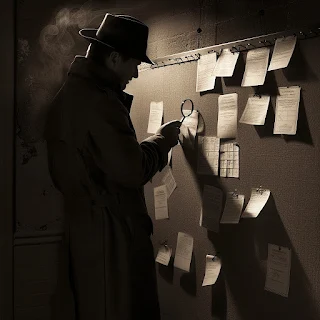Why Trauma Can Block Your Memories and How It Impacts Mental Health
When Memory Protects: The Link Between Trauma and Forgetting
Have you ever looked back on a difficult time in your life and realized entire pieces were missing—conversations you can't recall, moments that feel foggy or distant? You're not alone. For many people, especially those who’ve experienced trauma, memory doesn’t behave like a straightforward timeline. Instead, the brain sometimes blurs, distorts, or blocks out painful memories as a survival response.
This isn’t a flaw in your memory—it’s a reflection of just how deeply your mind tries to protect you. By exploring the connection between trauma and memory, we can better understand how the brain copes with overwhelming experiences, and why remembering—or not remembering—is a key part of healing.
I can relate to this more than I ever thought possible. There are pieces of my past that I simply can’t recall—parts of my trauma that feel like they’ve been wiped away, as if my mind was trying to protect me from the pain. At first, I thought it was just a natural part of aging, but I soon realized that these memory gaps were my brain’s way of shielding me from emotional harm. The more I learned about trauma and its impact on memory, the clearer it became that these missing pieces weren’t accidental. They were part of my mind’s protective mechanism, helping me heal and process in ways I didn't fully understand at the time.
What Is Trauma-Related Memory Loss?
Trauma-related memory loss, also known as dissociative amnesia, refers to the inability to recall important personal information, typically following a highly stressful or traumatic event. Unlike everyday forgetfulness, like misplacing your keys, dissociative amnesia involves significant gaps in memory that can include entire periods, events, or personal experiences related to the trauma.
According to a 2023 study dissociative amnesia serves as a protective mechanism, allowing individuals to block out distressing memories and prevent emotional overwhelm.
This protective response, however, is not without its challenges. While the brain’s ability to shield us from painful memories is a survival strategy, it can also leave us feeling disconnected from our past or struggle to make sense of our emotional experiences. Understanding how trauma impacts memory is essential to navigating the healing process, as it provides insight into why some memories resurface while others remain hidden.
The Brain's Role in Memory Suppression
How the Brain Stores—and Sometimes Hides—Traumatic Memories
Trauma impacts more than emotions—it changes how the brain processes and stores memories. Here are the three key regions involved:
🧠 Amygdala: The Emotional Alarm
This region processes fear and becomes hyperactive during trauma, making emotional memories feel intense and long-lasting.
🧠 Hippocampus: The Memory Organizer
Normally, it helps file memories into a clear timeline. But under stress, it can malfunction, leading to foggy, fragmented, or missing memories.
🧠 Prefrontal Cortex (PFC): The Regulator
The PFC oversees decision-making and emotional control. During trauma, it may go offline, later suppressing distressing memories to protect you.
Recent studies have shed light on these interactions. For instance:
Research indicates that the PFC's inhibitory control over the hippocampus plays a crucial role in memory suppression.
Specifically, the right dorsolateral prefrontal cortex (DLPFC) exerts a negative influence over brain areas supporting the reactivation of memories, facilitating the suppression of unwanted memories.
Common Myths and Truths
Common Myths About Trauma and Memory
🧠 Myth: If you can't remember a traumatic event, it wasn’t impactful.
✅ Truth: Memory gaps often signal how deeply a trauma affected you. Suppression is the brain’s way of protecting itself, not a sign that the event wasn’t serious.🧠 Myth: Everyone remembers their trauma vividly.
✅ Truth: Trauma affects people in different ways. Some may relive vivid, intrusive memories, while others may experience partial or complete memory loss of the event..
How Memory Loss Affects Mental Health
Memory gaps can lead to a profound sense of disconnection—not just from specific events, but from oneself. When pieces of the past are missing, it can be difficult to form a coherent personal narrative, which may cause anxiety, confusion, and even a fractured sense of identity.
💥 When the Past Shows Up in the Present
Sometimes, emotional reactions feel too big or seem to come out of nowhere. Trust can be hard to build, and relationships might feel tense without a clear reason. Often, these struggles are rooted in unresolved trauma. Even if we’re not fully aware of it, past experiences can shape our nervous system and emotional responses beneath the surface.
Can Suppressed Memories Resurface?
Yes, suppressed memories can resurface, often triggered by sensory stimuli, similar situations, or therapeutic interventions. However, the accuracy and reliability of these memories can vary. It's essential to approach them with care and seek professional guidance when they emerge.
Navigating Life with Trauma-Related Memory Loss
Even without full recollection, healing is attainable. Effective strategies include:
-
Grounding Techniques: Practices like deep breathing, mindfulness, and focusing on the present can help manage anxiety and dissociation, aiding trauma recovery.
-
Therapeutic Support: Engaging with trauma-informed therapists provides essential tools to process emotions and develop healthy coping mechanisms.
-
Self-Compassion: Understanding that memory suppression is a protective mechanism can alleviate self-blame and promote emotional healing.
As you explore these trauma healing strategies, it's essential to remember that each journey is unique. The healing process is not linear, and progress can look different for everyone. So, how do we embrace the healing process safely and with intention, focusing on building a fulfilling life despite the challenges?
🧠 Conclusion: The Power of Your Brain’s Resilience
Your brain’s ability to block out traumatic memories is a remarkable survival mechanism.
It’s not a flaw; it’s a protective strategy that helps you function in the face of overwhelming pain. While memory gaps can be frustrating or unsettling, understanding their purpose can be incredibly empowering. They’re a sign that your mind is doing what it needs to do to help you survive.
Healing doesn’t mean reliving every painful detail.
In fact, trying to force forgotten memories to resurface can sometimes do more harm than good. True healing comes from:
-
Staying grounded in the present
-
Nurturing your emotional needs
-
Building a life that feels safe and connected
It’s about reclaiming your story—not by filling in every blank, but by writing the next chapters with intention, compassion, and hope. ✨
Thank you for stopping by! Until next time, remember that you are not alone in your feelings or experiences. I've got your back! For more updates, click here.
Disclaimer: The information provided is for informational purposes only and should not be considered a substitute for professional advice. If you are struggling, it is important to seek help from a licensed mental health professional who can offer personalized guidance and support.
For more information about the topics discussed, consider visiting the following links:
1). https://pmc.ncbi.nlm.nih.gov/articles/PMC9162402/










Comments
Post a Comment
It is all about honest conversations here! Please be kind and courteous. I would love to hear your thoughts!
Be sure to check back soon because I do make an effort to reply to your comments here.